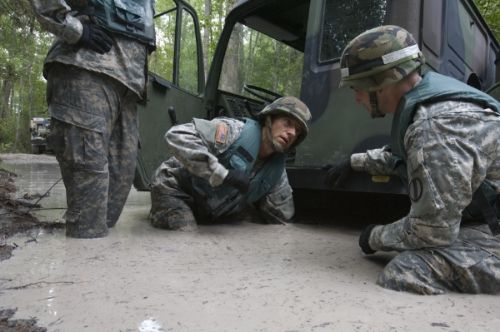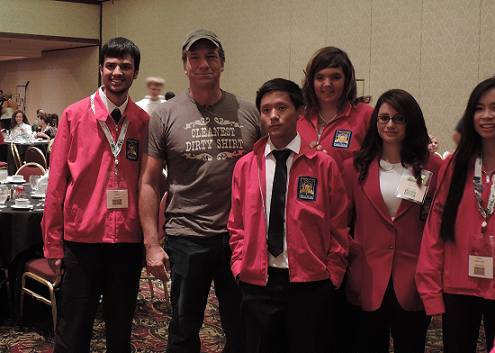Editor's note: This article first appeared in the March issue of Townhall Magazine.
America has a problem.
“We’re lending money we don’t have to kids who can’t pay it back, to educate them for jobs that no longer exist,” Mike Rowe of the mikeroweWORKS Foundation explains.
Although the country has become ‘profoundly disconnected,’ Rowe is doing his part to change that—and it all started while he was hosting the Discovery Channel’s hit series, “Dirty Jobs.”
The show was, at its core, a celebration of people who do the kinds of jobs that make civilization work. But it wasn’t until the economy crashed in 2008 that the series became relevant in ways neither Discovery nor Rowe could ever have imagined. Suddenly jobs and manufacturing, infrastructure and the skills gap were at the top of the headlines, and the “Dirty Jobs” perspective became highly sought after.
At the same time, after nearly four years of production, Rowe admitted he was growing a little tired of always promoting “Dirty Jobs” through the lens of exploding toilets and misadventures in animal husbandry.
“It was a big part of the show and I love all that stuff … but I just thought, you know, I’m not gonna promote “Dirty Jobs” anymore without affirmatively talking about some of the things I’ve heard on the show from business owners over the years,” he tells Townhall.
Recommended
But what he heard from business owners all over the U.S. conflicted with the headlines.
“There were still lots and lots of business owners who were desperate to find people willing to learn a trade and work, but they were getting zero press because that reality conflicted with rising unemployment,” he says. “So the skills gap was getting wider and wider and wider, but it was getting almost no attention.”
That’s when Rowe considered doing something to bring attention to the jobs that no one celebrates—the jobs that actually exist.
In 2008 mikeroweWORKS began as an online Trade Resource Center focused on educational opportunities that don’t necessarily involve a four-year degree (or debt). Information about trade schools, apprenticeships, financial aid, scholar- ships, and on-the-job training opportunities can be found on the site, which is broken down by state. Today, the nonprofit foundation has expanded its mission and is dedicated to helping close the nation’s skills gap by promoting hard work and supporting the skilled trades.
“I wanted to be able to point to an actual, tangible thing and say, ‘Look, don’t tell me that 14 million people who are unemployed are unemployed because there are 14 million too few jobs. It’s not that simple. And here are the jobs I’m talking about and they’re available right now, and all you have to do to get one is learn a trade and go to work,’” he says.
The foundation is putting its money where its mouth is by helping set young men and women on a track to fill the available jobs in America. This is done primarily through awarding scholarships to students who have a financial need, want to learn a useful skill, and are willing to work their tails off.
Most recently, the foundation, in conjunction with a handful of qualified technical schools, such as Tulsa Welding School and Midwest Technical Institute, created more than $1.6 million in education scholarships, according to Mary Sullivan, president of mikeroweWORKS. To receive a “work ethic scholarship,” students have to submit a video making a case for themselves, and the public then votes on who gets the money. Applicants even have to sign The S.W.E.A.T. Pledge (Skill & Work Ethic Aren’t Taboo). After all, the foundation is more than a scholarship fund; it’s also a PR campaign for the skilled trades, hard work, and ‘alternative’ education.
But closing the nation’s skills gap also requires understanding how we’ve arrived at a point where, according to the Bureau of Labor Statistics, there are 4 million available jobs that companies can’t fill.
Rowe believes the skills gap is simply a reflection of what Americans have come to value. It’s no coincidence that the “4-Hour Work Week” was the best- selling book for four years, he says, or that “American Idol” is one of the highest rated TV shows ever.
“It’s not just that it celebrates fame and success, it’s that it celebrates them in a way that creates the idea that you can have them overnight. And so the expectations of what work was, and is, started to change.”
Culturally, he says, we’ve influenced those changes as a society. “Portrayals of many really important positions became one dimensional and kind of hyperbolic,” Rowe explains. “If there’s a plumber on TV he’s gonna be 300 pounds with a giant butt crack, right?
“So all these stigmas, all these stereotypes, combined with all the assumptions of what a good job was versus a bad job, combined with the fact that, exponentially, we want our kids to have it better than we do, combined with the fact that the four-year degree becomes, in many people’s mind, not just the best way,” Rowe continued, “but the only way to have a viable shot at a prosperous living, combined with a trillion [dollars] in student loans, combined with the way shop classes have been systematically removed from high schools across the country—you put all of that together … it’s [the skills gap] not a mystery at all.”
There is no simple solution, of course but Rowe believes change begins with a conversation. “The way to start talking about the problem in a sensible fashion is … to start with what you think a good and worthwhile job looks like. And are you able, as an individual, to look at a job and see a stepping-stone, or do you look at it and assume or expect it to meet all of your needs?” he says, pointing to the unionization of fast food workers as an example.
“Dirty Jobs” and the foundation were important first steps to get the conversation started, and the PR campaign Profoundly Disconnected, which is a partnership between mikeroweWORKS and Caterpillar, is the next phase. Its goal is to challenge the prevailing belief that a four-year degree is the best path for the most people, especially considering many of the career opportunities out there today require a skill, not a diploma. While Rowe is challenging the four-year degree, he’s not challenging college or education, just debt.
“Typically, what I can do is go out and tell [young people] the truth in an unvarnished way,” he says. “I can talk very specifically about dozens of people I know who have taken jobs that, typically, most people go out of their way to avoid, and bend them into opportunities that not only pay the bills, but are allowing them to thrive.”
Overall, the campaign has done really well, he says. “Anytime you get a phone call from Bill Maher and Glenn Beck in the same day … there’s something there … both sides of the aisle understand the danger of becoming fundamentally disconnected.”
And as for the foundation as a whole, they’ll never be able to meet the need, he explains, but they have impacted hundreds who may not otherwise have been reached.
Last year alone, for example, 118 individuals were awarded scholarships through the $250,000 National Educational Scholarship Fund, a partnership with Scholarship America, to help students finish their course of study in a skilled trade.
Additionally, the foundation has granted 120 students travel scholarships to compete in SkillsUSA’s national conference, which brings together gold medal winners from each state to compete in one of more than 90 skills, according to Sullivan. Other educational and travel scholarships are in the works for 2014 and information can be found at MikeRoweWorks.com/home.
“I try not to look at the foundation any further than the next person it might be able to affect,” he says. And that’s really what mikeroweWORKS was always meant to be—a small effort that hopefully would lead to big changes.



























Join the conversation as a VIP Member